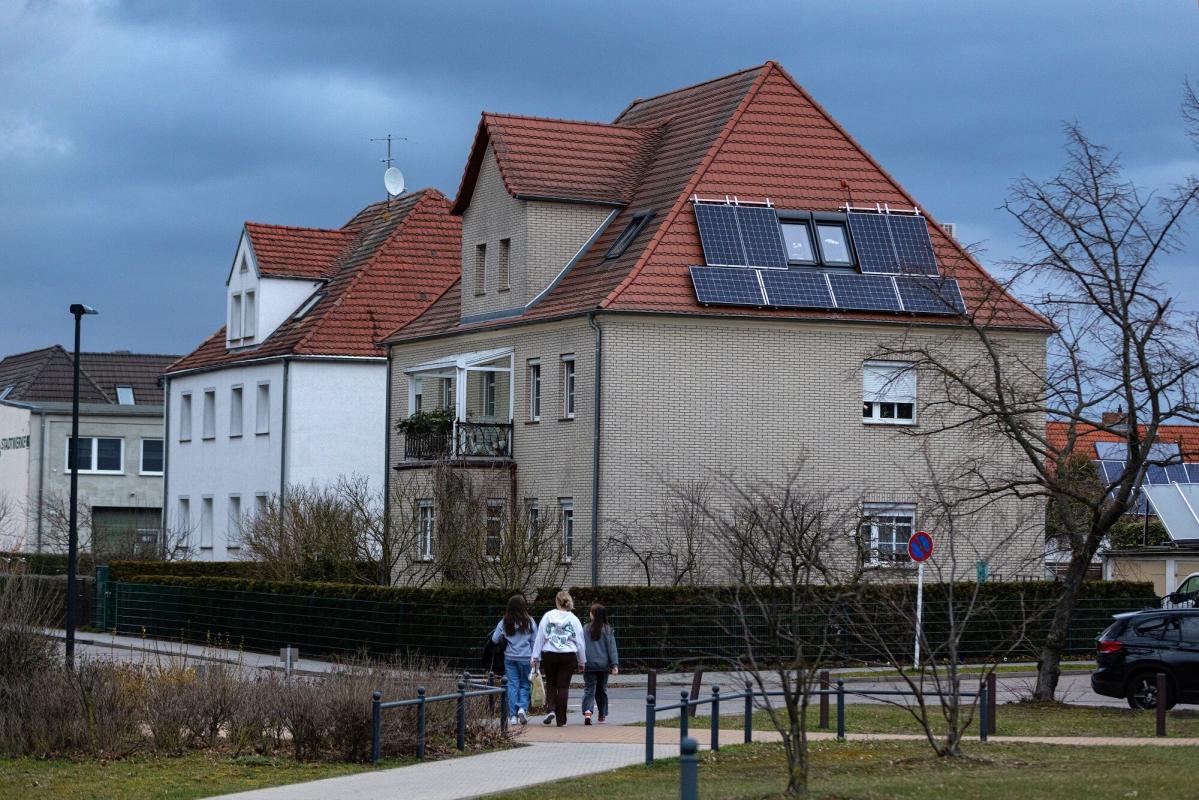
(Bloomberg) — Banks across Europe are trying to figure out how to manage a growing risk lurking in residential mortgage portfolios: energy consumption.
Most read on Bloomberg
In Germany, the bloc’s largest economy, it is becoming increasingly clear that many households are unwilling or unable to spend funds on improving the energy efficiency of their homes. Germany’s Bundesbank has already warned that inaction could lead to a significant drop in property values, with knock-on effects for the economy as a whole. Deutsche Bank AG, meanwhile, says only a tiny fraction of its residential customers are currently eligible for green loans.
“All banks face the same challenges,” said Tobias Horn, head of portfolio management for private banking in the Frankfurt-based bank’s risk department.
Deutsche Bank, which has a residential real estate portfolio of around 175 billion euros ($190 billion), estimates that a single-family home may need more than 100,000 euros of renovations to comply with the highest energy performance level. highest in the European Union. This equates to €80 billion in total for the bank’s residential property clients.
Such costs would add to regular mortgage payments and make debt servicing less affordable for homeowners. Deutsche Bank said in its latest annual report that “the greatest concentration of credit risk in lending, from a regional perspective, is in its home market, Germany, with a significant share of households, which comprise the majority of mortgage and real estate lending activities.”
The general observation in Europe is that “there is not enough money” to bring housing stock into compliance with the bloc’s targeted environmental standards, said Carsten Brzeski, chief economist at ING Germany. “We cannot force owners to make renovations. »
To help it cope with this situation, Germany’s largest bank is turning to structured capital relief instruments. On Friday, Deutsche unveiled a deal with the European Investment Bank that allows it to provide discounts on more than 600 million euros of green mortgages in its domestic market. The EIB will guarantee a mezzanine tranche of 150 million euros as part of a securitization of consumer loans, thereby reducing the German lender’s capital requirements.
Deutsche Bank says it is already considering more operations of this type to reduce its capital, which have emerged as an element of financial engineering likely to play an increasingly important role in Europe.
European banks must recognize that their residential property portfolios carry risks that green housing requirements highlight.
In the Netherlands, the central bank warned that credit-constrained borrowers who choose not to make their home carbon neutral would face a drop in the value of the collateral. At the same time, borrowers who mobilize their available resources to cover these costs risk making themselves “more vulnerable to negative shocks,” the central bank said. “In both cases, the risk of the loan increases.”
In the United Kingdom, Lloyds Banking Group Plc, which holds more than £300 billion ($380 billion) of mortgages, says Britain has “the oldest and most fragile housing stock” in the world. Europe. Yet nearly half of the nation’s homeowners are discouraged by the high upfront costs of improving the energy efficiency of their homes.
Rebecca Heaton, director of environmental sustainability at Lloyds, says the bank is “concerned about insufficient progress in decarbonising the UK’s 28 million homes”.
Meanwhile, in Italy, a project to make housing stock greener was mired in scandal after tax breaks for energy-efficient renovations led to large-scale fraudulent investments. The framework has since been partially reversed and the rules relating to tax credits revised.
The result is that European banks remain saddled with residential real estate assets that do not meet environmental regulatory requirements.
Earlier this year, European lawmakers adopted the Energy Performance of Buildings Directive. Implementation of the new law will happen gradually – over more than a decade – but landlords who fall too late risk finding themselves saddled with assets that can no longer be sold or rented. The EU estimates that around 85% of the bloc’s buildings were built before 2000, and that 75% of them have “poor energy performance”.
The EU has set a goal of reducing emissions from the building sector by 60% by 2030 and has made complete decarbonization a target for 2050. With 42% of energy consumed, buildings “are the largest energy consumer in Europe,” according to the European Commission.
Deutsche Bank says that despite the challenges, it expects that current investments in infrastructure, green energy supply and eco-friendly building materials will “enable progress towards net zero” in the German real estate sector .
But in Germany alone, more than 60% of homes are expected to undergo green renovations over the next decade to meet the EU’s stricter energy requirements. This process will cost between 740 and 1 trillion euros, according to estimates provided by ING Groep NV.
Horn says Deutsche has only obtained energy performance certificates for around 4% of residential real estate customers, significantly limiting its ability to issue green mortgages. Additionally, when a homeowner pays off the final installment of, say, a 30-year mortgage on a high-emissions home, that loan is wiped off the bank’s books, making it appear that the emissions from the house have disappeared.
In fact, “it makes no difference to German society’s real estate stock” and creates “a misleading picture” about emissions reductions, Horn said.
Deutsche Bank estimates that a third of its private real estate clients currently do not have the financial means to upgrade their homes to the highest energy class or a zero-carbon building. Ultimately, this poses a threat to Germany’s goal of becoming net zero by 2045.
Deutsche Bank is doing what it can, Horn says. But “if the customer does not want to commit to energy efficiency or does not have the financial means, the banks cannot do it”.
–With help from Steven Arons.
Most read from Bloomberg Businessweek
©2024 Bloomberg LP


